“Why isn’t every UAE school doing this?” – Brett Girven, Arbor Principal, on the simple way all UAE schools could cut CO2 emissions by 20%
UAE school-bus pollution represents 160,000 tonnes of CO2 per year – a figure that could quickly, simply and cheaply be cut by at least 20% if schools switched to biofuels, said experts at The Alliance for Sustainable Schools (TASS) conference in Dubai this week.
A lack of awareness and misapprehensions about the challenges of switching to biofuels means that school leaders are inadvertently responsible for tonnes of unnecessary fossil fuel pollution from school buses being pumped into the air that children breathe – a “ridiculous” situation that must stop now, said Brett Girven, Principal of Arbor School and convenor of the Dubai chapter of TASS.
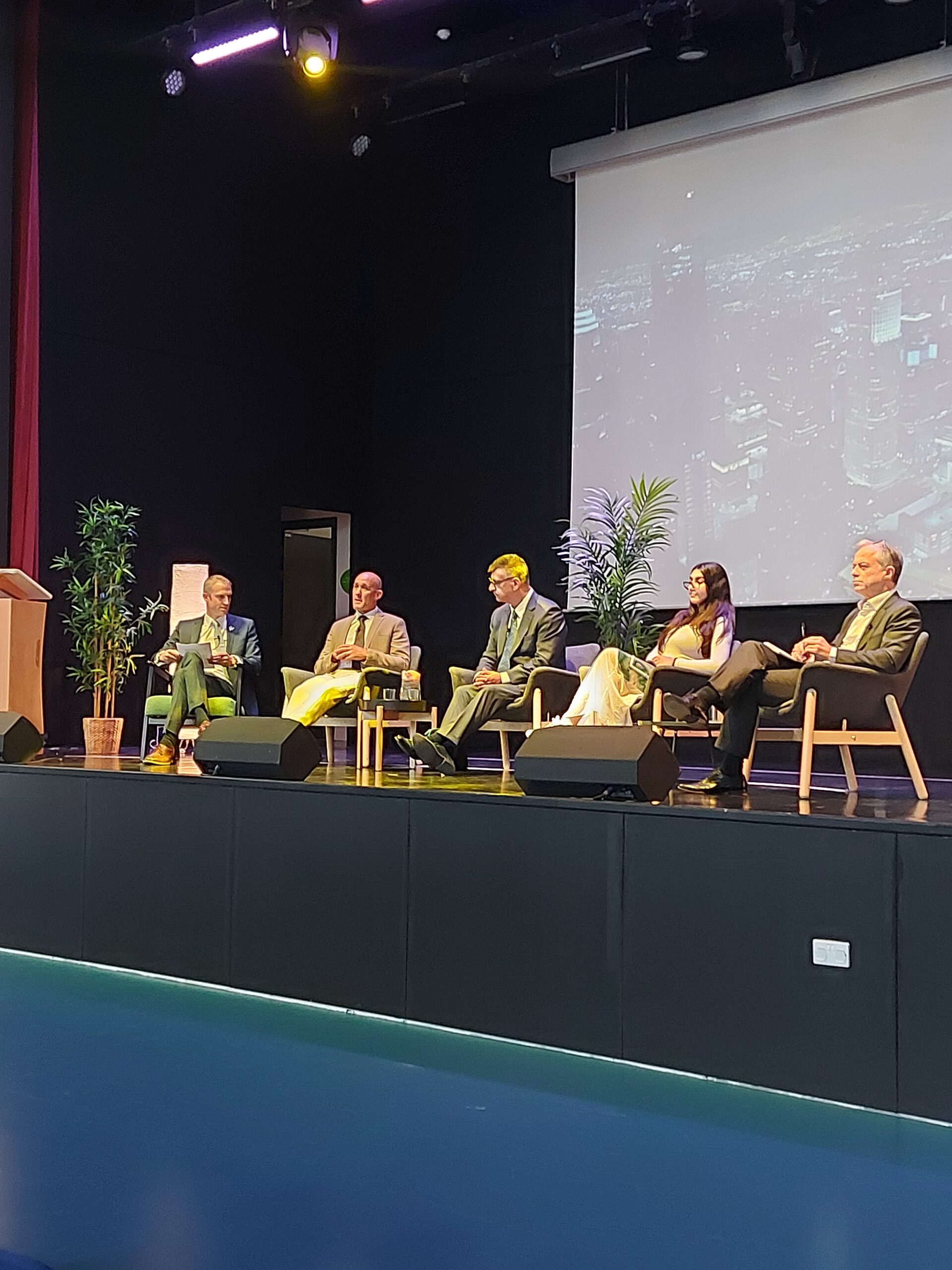
Brett Girven (second left) on stage at the TASS conference, along with Fairgreen International Primary Vice Principal David Gerber (far left), Neutral Fuels founder Karl Feilder (centre), Fairgreen student (second right) and TASS founder Mr Anthony Dixon (far right)
Mr Girven relayed how Arbor School recently switched its buses onto biofuel in an easy eight-week process that was facilitated by STS – the company they lease their buses from – and biofuels provider Neutral Fuels. No changes to the bus engines were required, and Mr Girven stated that the whole process – which included the additional step of setting up a re-fueling centre onsite – was so inexpensive that there has been no need to pass any extra cost on to parents.
Arbor is one of only a very limited number of schools in the UAE that are currently using B20 biofuel on their buses; other schools include several GEMS schools, Dubai College and American School of Dubai.
B20 biofuel is made up of 80% traditional diesel, and 20% biodiesel made from waste cooking oil. The waste oil is collected from school canteens or restaurants around the UAE, is chemically reacted with a catalyst to convert the triglyceride molecules into fatty acid methyl ester (FAME), and then mixed with the fossil fuel.
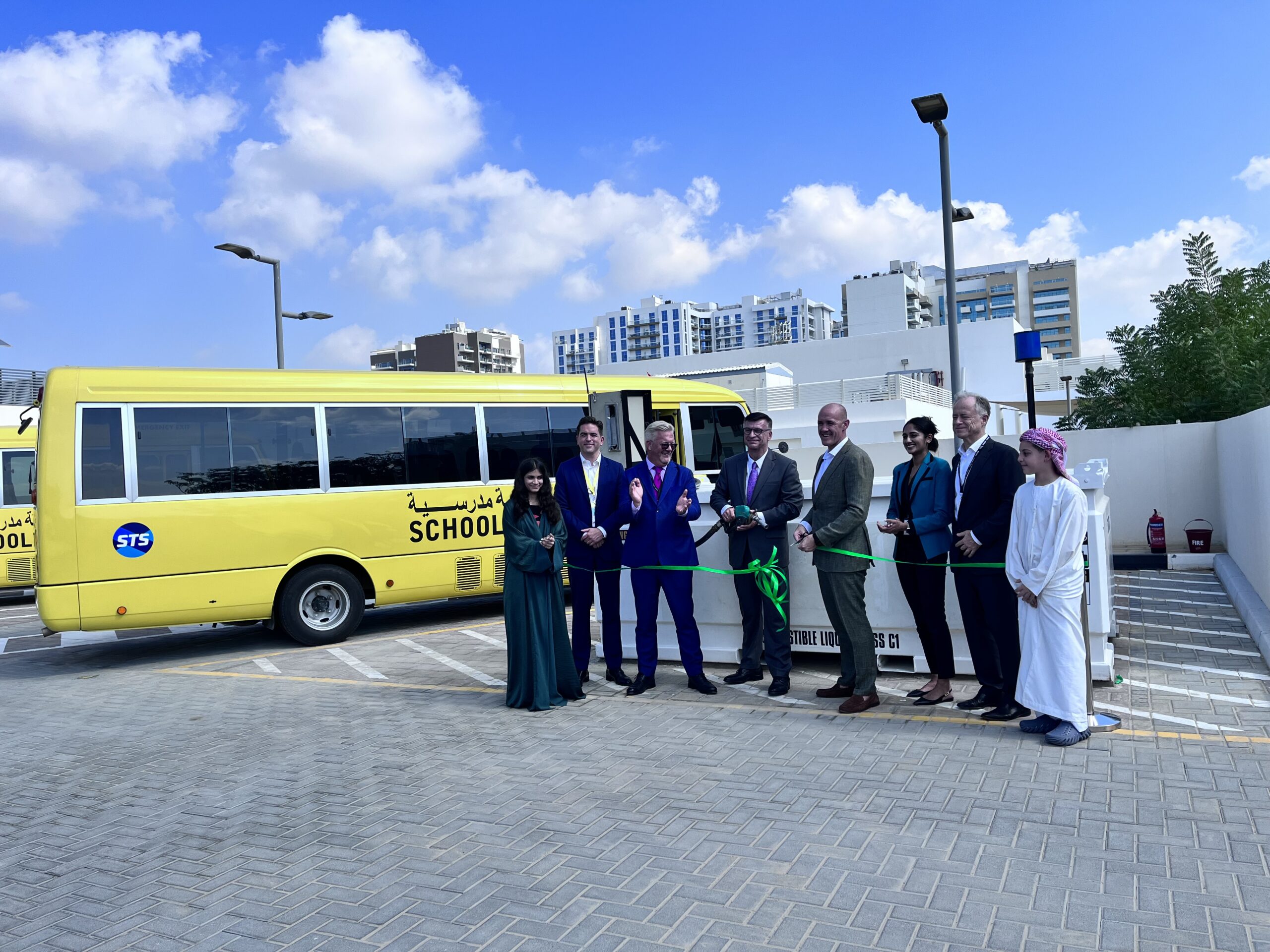
The ribbon cutting ceremony for Arbor School’s new biofuel station in November 2023
Vehicles operating on B20 emit 20% less CO2. If every school in the UAE were to switch to B20 tomorrow, it would cut UAE school bus emissions number by about 30,000 tonnes, said Mr Anthony Dixon, founder of TASS and renewable energy expert. That’s the equivalent of taking 10,000 cars off the road for a whole year.
Mr Girven made an impassioned plea to governmental and school leaders in the UAE to take action in the urgent fight against climate change, appealing for a mandate that all UAE schools should follow suit and switch to biofuels as soon as possible:
“The question isn’t ‘How to do it?’ The question is ‘Why is everyone not doing it already?”
“There are roughly 250 private schools in the UAE, and many more government schools.
“At the moment only a handful of them are using biofuels on their buses.
“It’s ridiculous!
“The barriers that people assume are in the way – costs and so on – they just aren’t there. It cost us just a smidge.
“And if our school can do it, then your school can do it too, and you are welcome to come and learn from us.”
The need for change
Held at Fairgreen International School on Tuesday 9 January 2023, the TASS conference brought together operations managers and sustainability leads from schools across the UAE to discuss how institutions can implement meaningful environmental initiatives and systemic sustainable change.
Of TASS’s four core areas of change – food, fuel, fashion and facilities – the focus was on fuel in this second edition of the 2023-2024 conference series.
Participants heard how there is a pressing need to tackle carbon emissions from road travel across the globe. Transport accounts for 24% of global CO2 emissions from energy, according to Our World in Data. Of that 24%, the vast majority (45.1%) comes from passenger road transport (not aviation, despite popular perception).
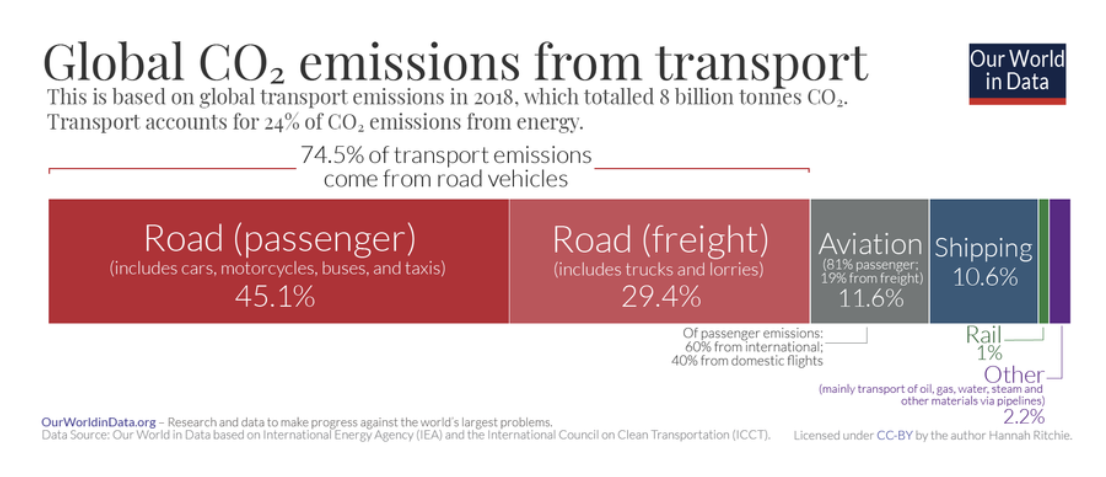
Source: Our World in Data
The UAE’s CO2 emissions from transport continue to grow at pace – not mitigated long-term by the pandemic-related slow-down, as many people hoped – and the transport sector has the fastest growing emissions figures after industry. Renewable energy expert and TASS founder Anthony Dixon said:
“There are roughly 15,000 school buses in the UAE, transporting 350,000 – 400,000 students per day.
“TASS estimates that around 1,200,000km are travelled by school buses per day – the equivalent of travelling to the moon three times.
“All this is adding around 160,000 tonnes of CO2 to the atmosphere. And it’s because almost all of these buses have been operating on fossil fuel for decades, and will most likely continue to operate on fossil fuels for decades to come.
“Which is why it is so important that we introduce biofuels to school buses now.”
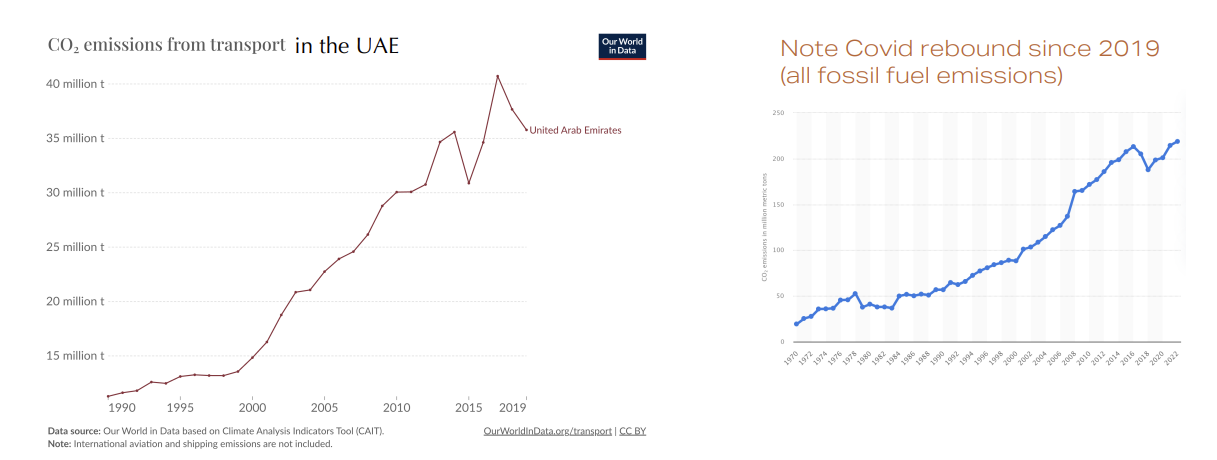
Source: Our World in Data, cited by The Alliance for Sustainable Schools (TASS) at the TASS conference in Dubai on 9 January 2024
What about Electric Vehicles?
Although many people look to electronic vehicles (EVs) as the way forward for fuelling sustainable transport, this is not a solution that will happen any time soon, said Mr Dixon.
“The electric vehicle transition – even with all the money and the best will in the world – is two decades away.
“I think it will be 20 years before we have every school in the UAE functioning with electric buses, and even then, the electricity won’t be decarbonized.
“On the other hand, biofuels are something we can do right now, which doesn’t require a massive investment, and which doesn’t require a change to the current infrastructure. And it would have a tangible impact.”
Anthony Dixon speaking at one of the breakout sessions at the TASS conference in January 2024
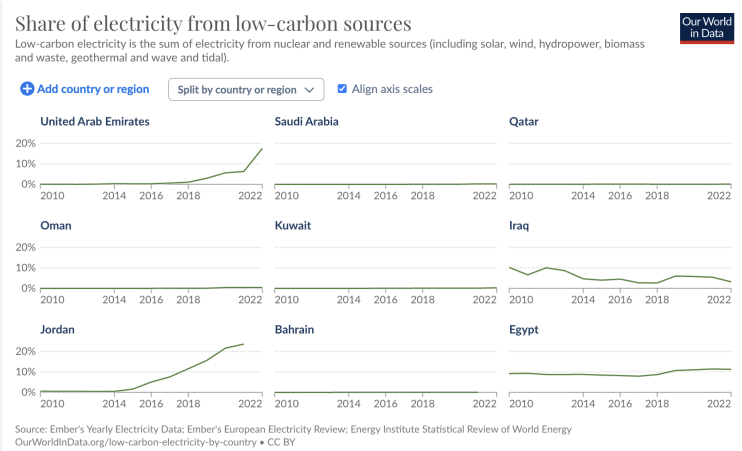
Source: Our World in Data, cited by The Alliance for Sustainable Schools (TASS) at the TASS conference in Dubai on 9 January 2024
While electric buses are the best solution long-term, EV uptake is still low and replacing existing vehicle stock will take time and money, Mr Dixon said:
“Of the 1.4 billion vehicles on the road only 20 million are EVs (1.4%).
“There are 10,000 EVs in Abu Dhabi and Dubai at this point in time.
“There are currently 914 charging points in the UAE.
“The UAE’s target is for 10% of new sales to be electric by 2030 and 70% of buses to be electric by 2050.”
In contrast, switching school buses to biofuel, the low-carbon alternative to fossil diesel, is something that can happen today, for minimal expense.
Why B20 fuel?
Biofuel can be made from a blend of traditional diesel and renewable oils at any ratio – including B100 (pure biofuel), B20 (20% biofuel and 80% regular diesel) and B5, which some UAE school buses also use, made from 5% renewable-source fuel and 95% traditional petroleum diesel.
It is possible to use biofuel from 100% recycled cooking oil (B100) in school buses without needing to change the engine, which would reduce carbon emissions by a more significant 86.5% (it is not 100% as there are some chemicals and energy involved in the conversion process, which have their own carbon footprint).
However, there are certain technical reasons that B100 is not the current choice for most UAE school buses. Karl Feilder, founder of Neutral Fuels – which pioneered the commercial use of biofuels in the Middle East and Africa – explains:
“McDonald’s UAE has been using B100 in unmodified engines for 12 years, with its supply chain delivery fleet now covering a total of 26,000,000 km, with no negative impact on fuel consumption or engine life. There are no engineering changes required, but use of B100 may impact the vehicle warranty at the start of the vehicle’s life.
“B100 is more expensive than regular diesel in the UAE, because 80% of the UAE’s waste cooking oil is exported to Europe, where the price of diesel (and therefore biodiesel) is about double the UAE price.
“The UAE government is looking at steps to limit or restrict the export of many waste streams, including Used Cooking Oil, as glass, plastic, paper and others all have the same challenge, which is preventing the growth of the UAE’s own circular economy.”
B20 fuel is more cost effective for schools, meaning that there should be no barrier to its immediate implementation.
What do UAE schools have to do to implement biofuels on buses?
It takes roughly two months for a school to implement the use of biofuels on UAE school buses, outlined TASS founder Anthony Dixon. He shared an estimated timeline – from meeting with the bus company and fuel supplier on site in week one, to installation and commissioning in week eight.
Although biodiesel is not widely available at regular gas filling stations in the UAE, a biodiesel storage tank can be installed on school premises, allowing bus drivers to refuel on site and thus saving the time and costs involved in driving to find a biodiesel refuel station.
Mr Dixon explained that a 6,000-litre tank can hold about two weeks’ worth of fuel for a fleet of 20 buses:
“The tank is refilled when needed using a mobile fuel truck.
“The tank and a fuel pump can be installed easily and quickly. The tank design has been pre-approved for safety by the fire department. Regulatory and technical approvals and testing and commissioning take about 2-3 weeks.”
Source: TASS
Mr Dixon also shared a rough breakdown of costs for a typical school, with an estimated overall sum of around Dh35,000, including a 6,000-litre storage tank (Dh10,000), concrete footing and fencing (roughly Dh10,000), and administrative approvals (roughly Dh5,000).
Mr Dixon gave an overview of how the daily operating costs would manifest in terms of cost-per-head on school buses:
“B20 is around 10% more expensive than fossil diesel, but fuel costs only represent 15% of the operating costs of the bus service, so the overall impact of B20 on the cost of the bus service is about 1.4%.
“If this cost were passed through to parents it would amount to an increase of less than Dh100 per student per year.
“Alternatively the cost could be recovered by increasing the average occupancy of the bus fleet by one rider.”
Increasing the number of bus riders is another key way that carbon emissions could be lowered, through reducing the number of individual cars on the roads. Our sister website WhichSchoolAdvisor has an innovative idea on this front… Read: Free public transport for Dubai schools? Why not?!
Mr Dixon said that there is no reason why, in theory, all the schools in the UAE couldn’t start operating on B20 biofuel from tomorrow. He reiterated that if that were to happen, it would cut UAE school bus emissions number by about 30,000 tons (20%) – the same as taking 10,000 cars off the road for a whole year.
Considering the requirements of UAE’s Ministry of Education’s Green Education Goals, announced in April 2023, the switch to biofuel is a realistic and relatively ‘easy win’ for UAE schools wanting to meet the requirements of the Greening Schools initiatives.
Any UAE school interested in lowering their carbon emissions this way may contact TASS if they are already a member, or may easily sign up to become a member of this non-profit network of schools committed to accelerating the transition to a sustainable future.
Brett Girven, Arbor School Dubai Principal and convenor of the UAE chapter of TASS, outlined the TASS ambition to help facilitate the conversion of all UAE school buses to biofuels:
“If we can get that handful of schools currently using biofuels to grow to be 30 schools, then 50 schools, then 100 or more, and then make a mandate that requires all school buses to switch to biofuels, then that is the only way forward here.”
Addressing the operations and sustainability leads in the crowd, Mr Girven made a direct plea to them – and to all teachers, educators, parents and students in the UAE – to force their school leaders’ hands into action:
“Please, lean on your operations leaders or other decision makers in your school and say that this is not even an option. It has to become ubiquitous. It has to be taken off the table as a question. Just do it.”
Do you have a sustainable solution for UAE schools? We would love to hear from you. Please get in touch at [email protected].
Read more: 50% OF UAE SCHOOLS MUST ‘GO GREEN’, SAY MOE OFFICIALS IN LANDMARK COP28 RULING











































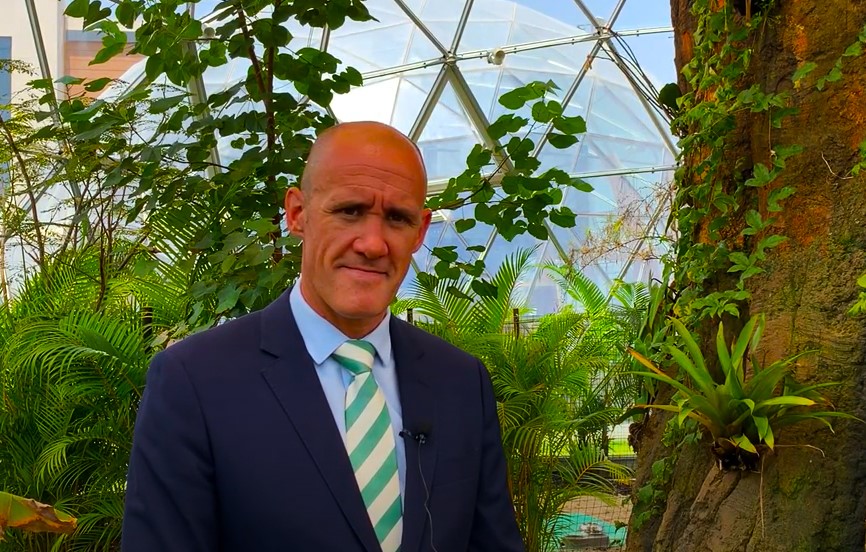

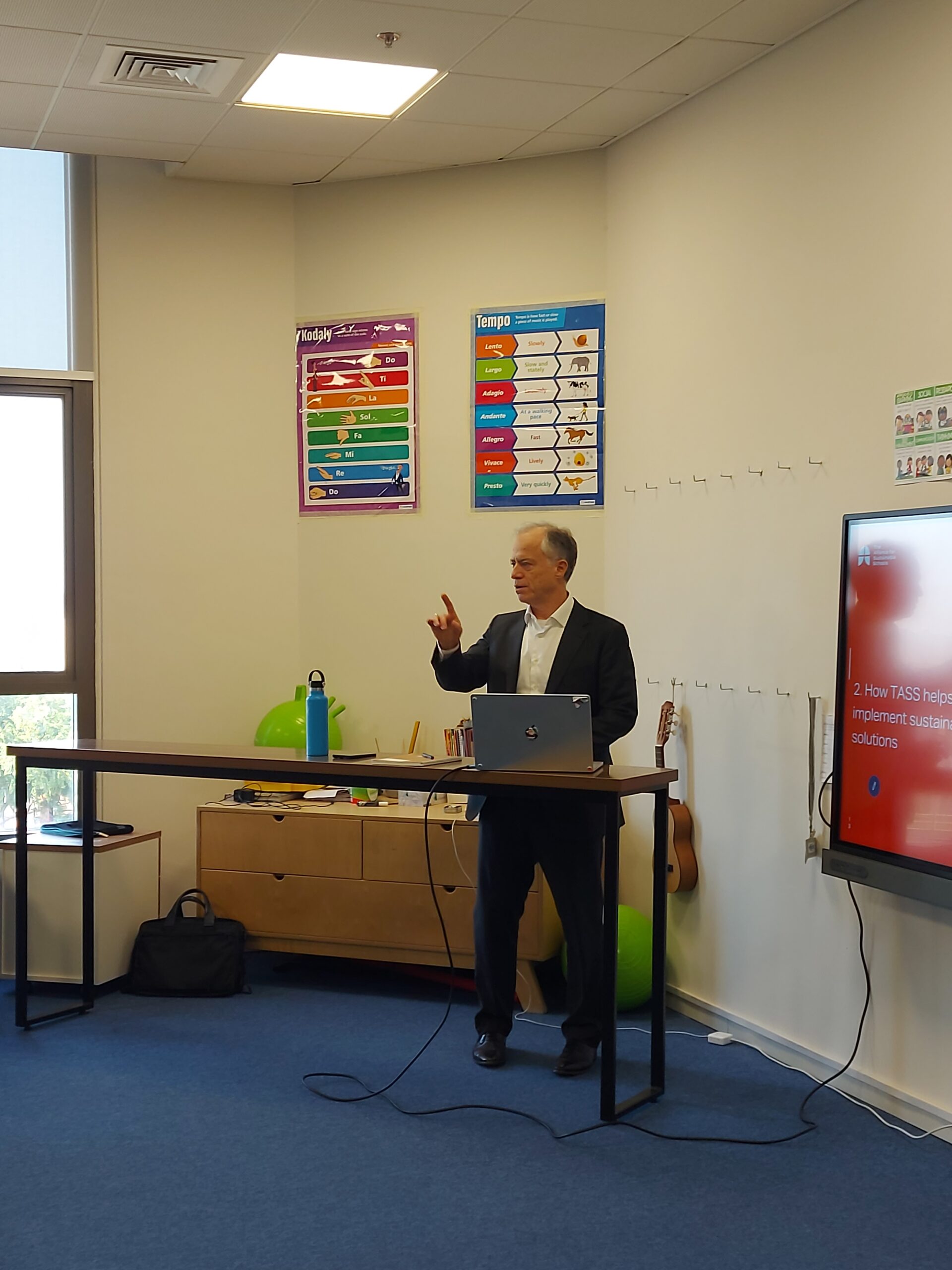
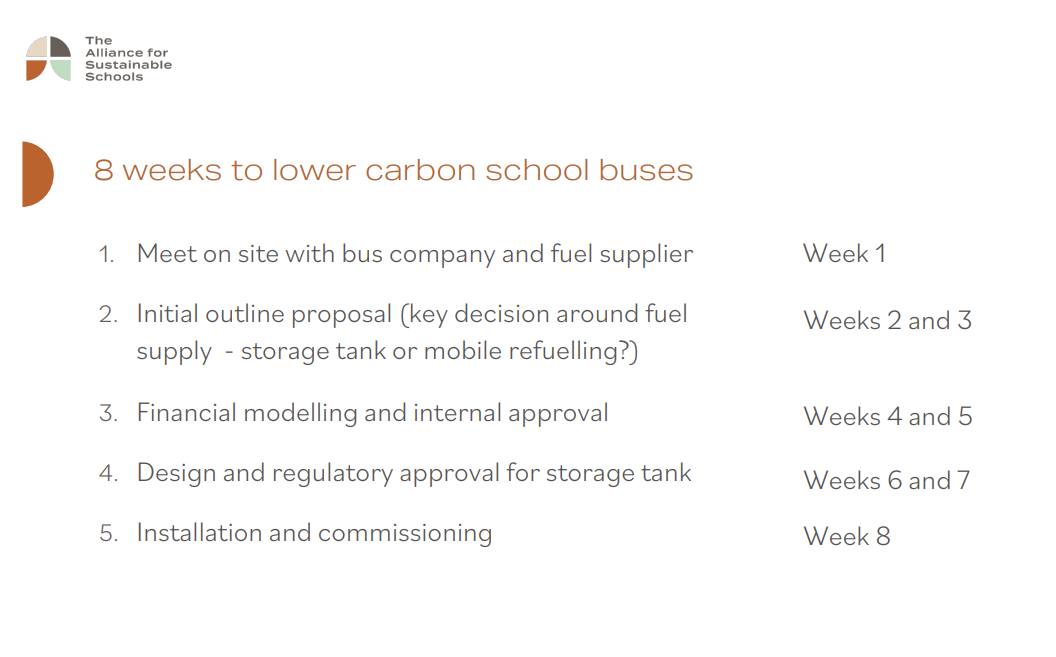
















Leave a Response